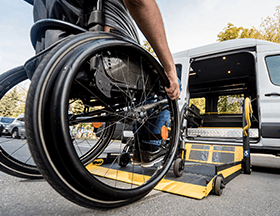5 things to know about medical transportation

Assured & Associates Personal Care of Georgia provides medical transportation in Atlanta, Altamonte Springs, FL, DeKalb County, Marietta, GA, Douglasville, Alpharetta and surrounding areas.
- Diverse Types of Medical Transportation:
Medical transportation encompasses various modes, including ambulances, medical taxis, air ambulances, and non-emergency medical transport vehicles. Each serves a specific purpose, ranging from urgent medical emergencies to routine, scheduled appointments for individuals with limited mobility.
2. Specialized Vehicles and Equipment:
Medical transportation vehicles are equipped with specialized features to ensure the safe and comfortable transport of individuals with medical needs. This may include features such as stretcher systems, wheelchair lifts, medical monitoring equipment, and accommodations for individuals with disabilities.
3. Emergency vs. Non-Emergency Medical Transportation:
There is a distinction between emergency and non-emergency medical transportation. Emergency medical transportation, typically provided by ambulances, is designed for critical situations requiring immediate attention. Non-emergency medical transportation is used for individuals with medical conditions who do not require urgent care but may have difficulty using conventional transportation.
4. Regulations and Licensing:
Medical transportation services are subject to specific regulations and licensing requirements to ensure the safety and well-being of patients. Compliance with local, state, and federal regulations is essential for providers, covering aspects such as vehicle safety standards, driver certifications, and adherence to medical protocols.
5. Coordination and Accessibility:
Coordinating medical transportation involves communication between healthcare providers, patients, and transportation services. Efficient coordination ensures that individuals with medical needs can access the appropriate mode of transportation when required. Accessibility is a key consideration, addressing the unique needs of individuals with disabilities or mobility challenges to ensure they can travel safely and comfortably.
Understanding the various facets of medical transportation is crucial for healthcare professionals, patients, and their families. It involves knowing the different types of transportation available, the specific needs they address, compliance with regulations, and the coordination required to facilitate timely and safe transport for individuals with medical conditions. Kindly call us without hesitation.

